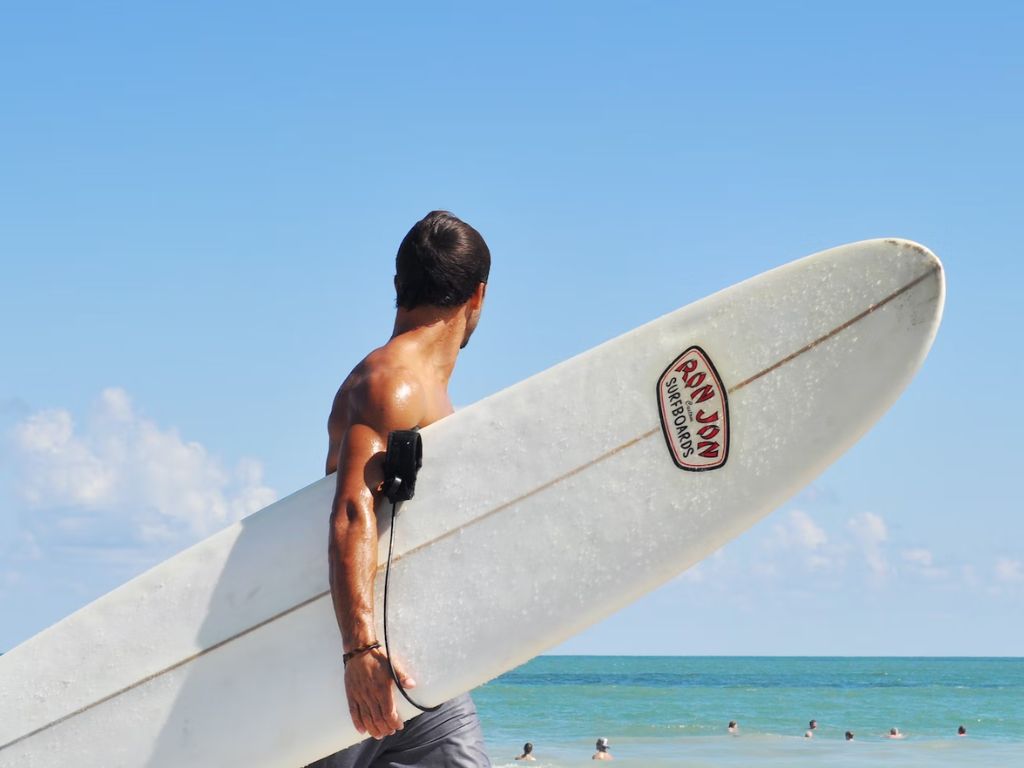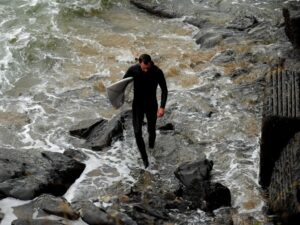Surfing, with its thrilling waves and feeling of freedom, has captivated adventurers’ hearts worldwide. The exhilaration of catching a wave and gliding along its powerful force is an experience like no other. However, the fear of riding waves can be a significant hurdle for many aspiring surfers.
Unfortunately so, fear can have a profound impact on your surfing performance and enjoyment. It hinders your progress and limits your willingness to take risks. However, by taking proactive steps and adopting the right mindset, you can develop the confidence and skills needed to face any wave that comes your way.
Education is key when it comes to conquering fear. So, I’ll explore the importance of educating yourself about wave dynamics, surf conditions, and proper surf etiquette.
By understanding the elements at play and knowing how to navigate the surf environment safely, you’ll be better equipped to manage fear and make informed decisions in the water.
1. Educate Yourself

Understanding how waves form and behave is crucial for any surfer. Waves are not random occurrences but the result of various factors such as wind, swell direction, and ocean floor topography.
Choosing the right surfboard is crucial for your progress and comfort in the water. Different surfboard shapes, sizes, and materials cater to various skill levels and wave conditions.
Educate yourself about the different types of surfboards, their characteristics, and how they affect your surfing performance. Additionally, understanding essential surf equipment such as leashes, wax, and fins will enhance your overall experience and ensure you’re well-prepared for each session.
2. Start with Small Waves and Gentle Conditions
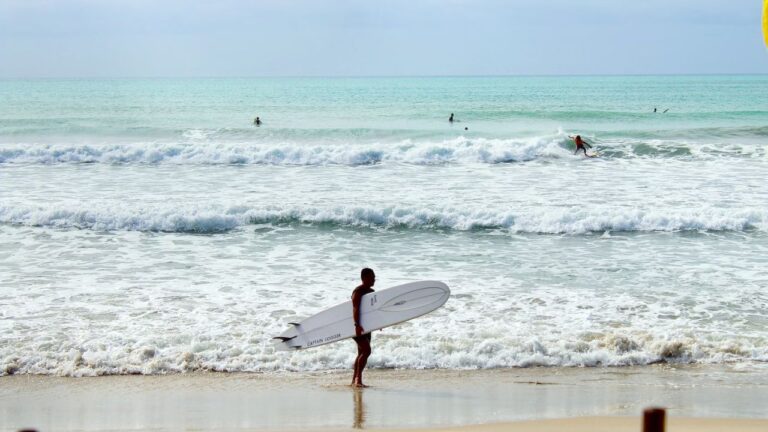
Starting small can make a big difference when overcoming the fear of surfing waves.
Selecting the right surf break is crucial for beginners looking to build confidence. Look for surf spots known for their forgiving and consistent waves.
These breaks typically have smaller, mellow waves that are easier to navigate and provide a less intimidating environment for novice surfers.
Research local surf spots or seek advice from experienced surfers or instructors to identify suitable locations for beginners.
Mastering the fundamentals of surfing in a controlled environment will help you build confidence. Spend time practicing paddling techniques, pop-ups, and board control in small waves.
3. Take Progressive Steps
Once you feel comfortable riding small waves, it’s time to gradually increase the size of the waves you tackle. This progression allows you to adapt to more powerful and challenging conditions at a pace that matches your skill level.
Start by seeking slightly larger waves than you’re accustomed to, ensuring you feel in control and confident in your abilities. With each successful experience, you’ll build trust in your skills and diminish the fear of bigger waves.
Don’t forget to expose yourself to various surf breaks and wave conditions to overcome fear and gain experience. Venture out to different spots that offer different types of waves, such as beach breaks, point breaks, or reef breaks.
Finally, having guidance and support from experienced surfers or professional instructors can be invaluable in overcoming fear and taking your surfing to the next level. They can provide insights, techniques, and safety tips for the breaks and conditions you’re tackling.
4. Practice Water Safety
When it comes to surfing, safety should always be a top priority. Wear appropriate safety gear, such as a leash and surf helmet.
A leash keeps you connected to your surfboard, preventing it from drifting away and minimizing the risk of injury to yourself and others. Additionally, a surf helmet can provide protection against head injuries.
The next step is to simply be aware of your surroundings. Maintaining situational awareness is vital in the lineup.
Always be mindful of other surfers, swimmers, and potential hazards like rocks or reefs. Look for changes in wave patterns or currents that may affect your safety.
5. Develop Surfing Skills and Technique
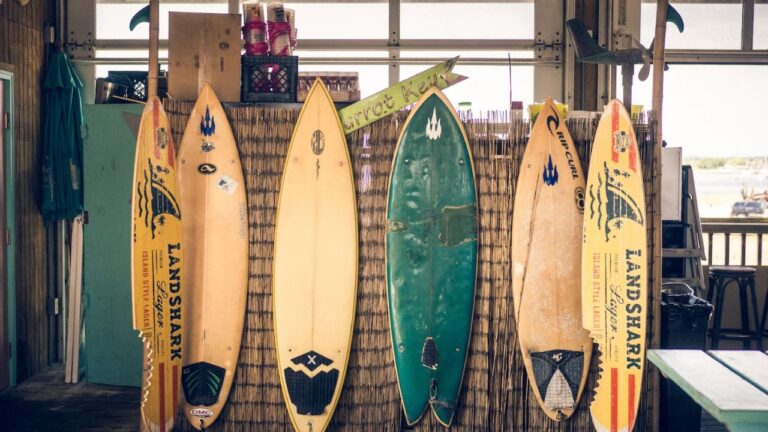
By improving your proficiency on the board, you’ll build confidence and feel more in control when facing challenging wave conditions.
Practice paddling techniques to build strength and endurance. Focus on efficient paddling strokes and proper body positioning to maximize your speed and control in the water. Work on your board control skills, such as maneuvering and turning smoothly, to enhance your overall surfing performance.
Enrolling in surf lessons or joining coaching programs can greatly accelerate your learning curve and help you refine your surfing skills. Utilize their expertise to enhance your progression and gain confidence in your surfing.
6. Visualization and Mental Preparation
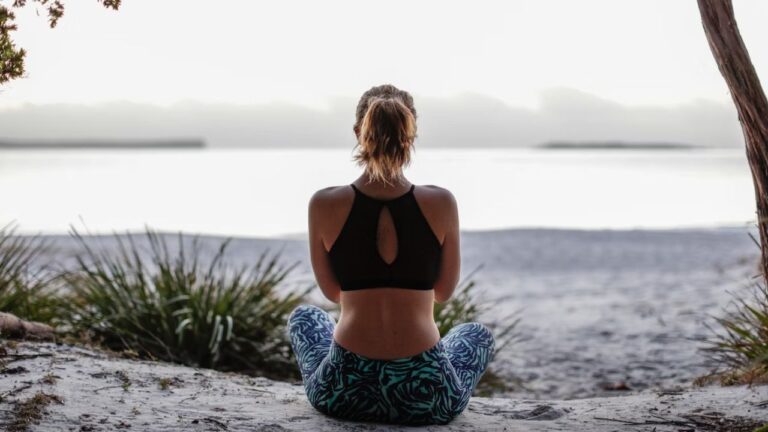
Surfing is not just a physical activity; it also requires mental strength and focus. Your mindset plays a crucial role in how you approach and overcome fear.
Visualization involves creating vivid mental images of yourself successfully navigating waves and enjoying the surfing experience. Before hitting the water, take a few moments to close your eyes and imagine yourself riding waves with ease.
Try to visualize the specific movements, sensations, and positive outcomes. This mental rehearsal helps familiarize your mind with the desired outcome, reducing anxiety and boosting self-belief.
Deep breathing exercises and relaxation techniques can help calm your mind and body, reducing anxiety and fear.
7. Surf with Supportive Peers or a Surfing Community

Surrounding yourself with supportive peers or becoming part of a surfing community can greatly contribute to overcoming fear and enhancing your surfing journey.
Joining a surf club or finding a group of fellow surfers can provide a sense of camaraderie and support. Being part of a community allows you to share experiences, seek advice, and learn from others facing similar fears and challenges.
8. Embrace a Growth Mindset
Fear is a natural response when faced with new challenges, especially in the dynamic and unpredictable surfing environment. Instead of letting it hold you back, recognize it as a normal part of the learning process.
Pushing yourself outside your comfort zone expands your capabilities and builds resilience. Every wave, even the small ones, presents a chance to improve your technique and build confidence.
As you work towards overcoming fear and improving your surfing abilities, it’s important to celebrate every milestone and small victory along the way. Recognize your progress, whether catching your first wave, successfully maneuvering through a challenging section or spending more time in the water.
Expert QnA
Q. Is fear common among beginner surfers?
Fear is a common experience for many beginner surfers. It’s natural to feel apprehensive when facing new challenges and the power of the ocean.
Q. Can fear of big waves be overcome?
Overcoming the fear of big waves takes time and practice, but it’s possible. You can conquer your fear by gradually exposing yourself to larger waves, building your skills, and gaining confidence.
Q. How can I manage fear during wipeouts?
Wipeouts can be intimidating, but proper technique and understanding can help. Practice holding your breath, relaxing your body, and learning how to fall safely to minimize the impact and regain control.
Q. What if I've had a negative surfing experience?
It’s important to address any negative experiences and associated fears. Seek professional guidance, consider surf therapy programs, or take gradual steps to rebuild confidence and trust in the water.

